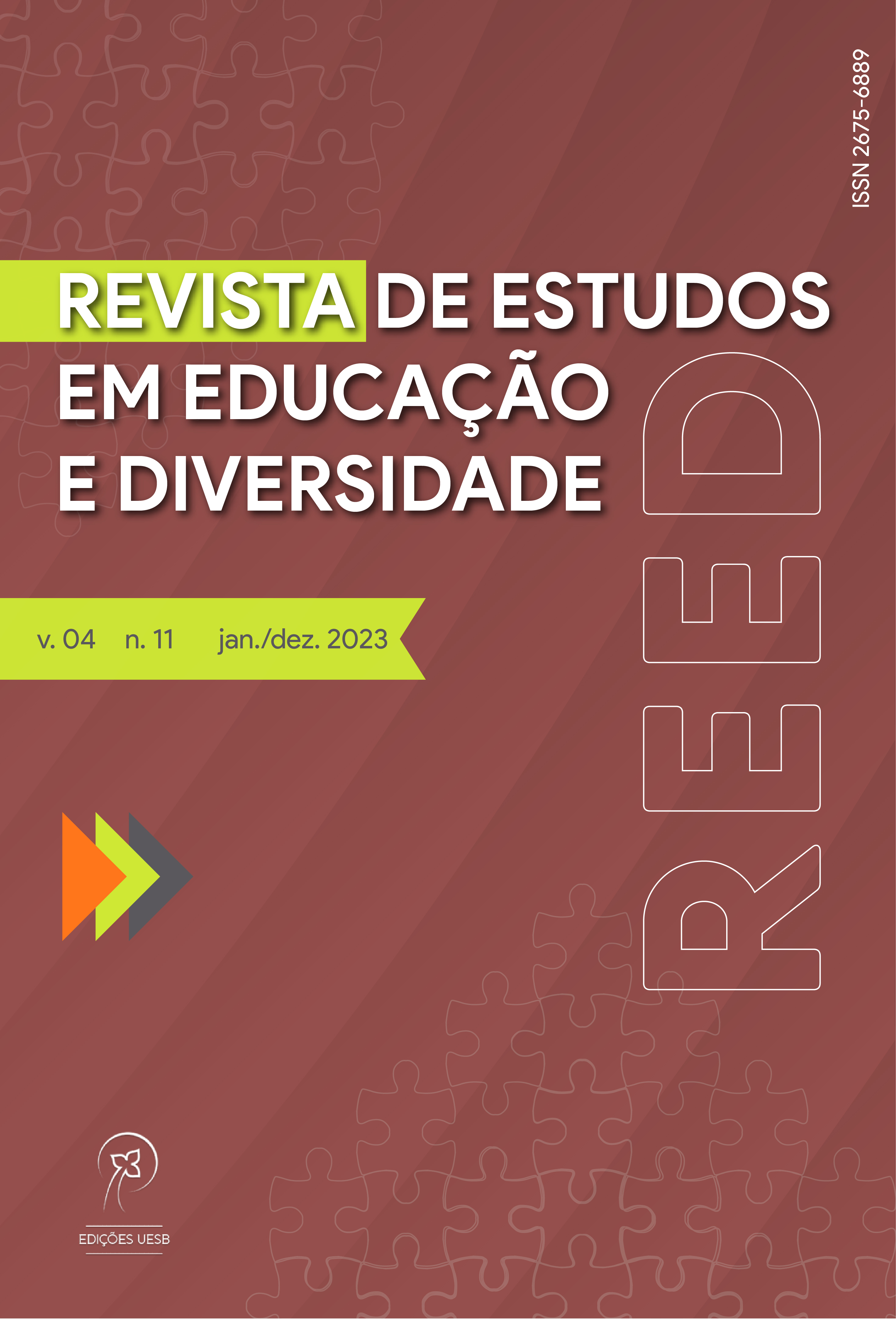Historia de la mujer en la educación infantil: posibilidades docentes a partir de la obra “Frida Kahlo”
DOI:
https://doi.org/10.22481/reed.v4i11.13607Palabras clave:
Enseñanza, Frida Kahlo, Historia de las MujeresResumen
Este texto busca plantear algunas reflexiones sobre las necesidades y posibilidades de desarrollar prácticas docentes que atiendan y promuevan la valorización de la historia de las mujeres, desde la educación infantil. Para ello, me baso en observaciones de los estudios de género y la historia de las mujeres para discutir las posibilidades de utilizar la literatura como mediadora para esta propuesta. Así, a partir de la selección de la obra “Frida Kahlo”, de Nadia Fink y Pitu Saá, de la Colección Antiprincesas, publicada por Chirimbote SUR, establezco reflexiones y planteo posibilidades de cómo conducir prácticas educativas desde la educación infantil hasta la apreciación. de la historia de las mujeres.
Descargas
Citas
ANTIPRINCESAS EANTI-HERÓIS. Site. s/d. Disponível em: http://www.antiprincesas.com.br/#a-colecao. Acesso em: 10 maio 2023.
BRASIL. Edital 04/2015 – CGPLI. Edital de convocação para o processo de inscrição e avaliação de obras didáticas para o Programa Nacional do Livro Didático PNLD 2018. Disponível em: http://portal.mec.gov.br/index.php?option=com_docman&view=download&alias=39561-pnld-2018-edital-pdf&Itemid=30192. Acesso em: 10 maio 2023.
CHARTIER, Roger. História Cultural: entre práticas e representações. 2. ed. Algés: DIFEL, 2002.
FERREIRA, Andressa; MORENO, Jean Carlos. Antiprincesas no ensino de história: potencialidades dacoleção para a decolonização das práticas educativas na América Latina. In: Encontro Nacional: Perspectivas do Ensino de História: “Histórias, Memórias e Projetos para o ensino de História do Brasil. 11, 2020, Belém. Anais [...]. 11, Belém, 2020.
FIGUEIREDO, Angela. Beleza Negra: Representações dobre o cabelo, o corpo e a identidade das mulheres negras. 1. ed. Belo Horizonte: UFRB - Fino Traço, 2016.
FINK, Nadia; SAÁ, Pitu. Frida Kahlo. Chirimbote SUR, Florianópolis, 1016.
GOMES, Nilma Lino. Sem perder a raiz: corpo e cabelo como símbolo da identidade negra. 2. ed. Belo Horizonte: Autêntica, 2006.
PAULA, Elenice de; ZALUSKI, Jorge Luiz. Gênero, interseccionalidade e ensino de história. Práticas Educativas, Memórias e Oralidades - Revista Pemo, v. 4, p. e49167, 2022. Disponível em: https://revistas.uece.br/index.php/revpemo/article/view/9167. Acesso em: 22 jun. 2023.
PESAVENTO, Sandra Jatahy. O mundo como texto: leituras da história e da literatura. Revista Brasileira de História da Educação. v. 7, n. 14, jul./dez. 2003. Disponível em: https://seer.ufrgs.br/asphe/article/view/30220. Acesso em: 22 jun. 2023.
PINSKY, Carla Bassanezi; PEDRO, Joana Maria (org.). Nova história das mulheres. São Paulo: Contexto, 2012.
RAU, Maria Cristina Trois Dorneles. Educação Infantil: práticas pedagógicas de ensino e aprendizagem. Intersaberes, Curitiba, 2012.
RAUDA, Jamis. Frida Kahlo. Editora Martins Fontes, 2015.
SCOTT, Joan. Gênero: uma categoria útil de análise histórica. Educação e Realidade, Porto Alegre, v. 20, n. 2, p. 71-99, jul./dez., 1995.
ZALUSKI, Jorge Luiz. No “box explicativo”: livros didáticos, Revolução Russa e a história das mulheres no PNLD 2018. Sobre Ontens. Paranavaí-Rio de Janeiro, v.1, p. 51-74, 2018. Disponível em: https://revistasobreontens.blogspot.com/p/volumes-anteriores.html. Acesso em: 22 jun 2023.
Descargas
Publicado
Cómo citar
Número
Sección
Licencia
Derechos de autor 2023 Revista de Estudos em Educação e Diversidade - REED

Esta obra está bajo una licencia internacional Creative Commons Atribución 4.0.
Usted es libre de:
Compartir — copiar y redistribuir el material en cualquier medio o formato; Adaptar — remezclar, transformar y construir a partir del material para cualquier propósito, incluso comercialmente. Esta licencia es aceptable para Obras Culturales Libres. La licenciante no puede revocar estas libertades en tanto usted siga los términos de la licencia.
Bajo los siguientes términos:
Atribución — Usted debe dar crédito de manera adecuada, brindar un enlace a la licencia, e indicar si se han realizado cambios. Puede hacerlo en cualquier forma razonable, pero no de forma tal que sugiera que usted o su uso tienen el apoyo de la licenciante.
No hay restricciones adicionales — No puede aplicar términos legales ni medidas tecnológicas que restrinjan legalmente a otras a hacer cualquier uso permitido por la licencia.






